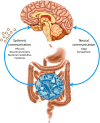Gut microbes and the brain: paradigm shift in neuroscience - PubMed (original) (raw)
Review
Gut microbes and the brain: paradigm shift in neuroscience
Emeran A Mayer et al. J Neurosci. 2014.
Abstract
The discovery of the size and complexity of the human microbiome has resulted in an ongoing reevaluation of many concepts of health and disease, including diseases affecting the CNS. A growing body of preclinical literature has demonstrated bidirectional signaling between the brain and the gut microbiome, involving multiple neurocrine and endocrine signaling mechanisms. While psychological and physical stressors can affect the composition and metabolic activity of the gut microbiota, experimental changes to the gut microbiome can affect emotional behavior and related brain systems. These findings have resulted in speculation that alterations in the gut microbiome may play a pathophysiological role in human brain diseases, including autism spectrum disorder, anxiety, depression, and chronic pain. Ongoing large-scale population-based studies of the gut microbiome and brain imaging studies looking at the effect of gut microbiome modulation on brain responses to emotion-related stimuli are seeking to validate these speculations. This article is a summary of emerging topics covered in a symposium and is not meant to be a comprehensive review of the subject.
Copyright © 2014 the authors 0270-6474/14/3415490-07$15.00/0.
Figures
Figure 1.
Bidirectional communication channels between the gut microbiome, the gut, and the brain. Endocrine-, neurocrine-, and inflammation-related signals generated by the gut microbiota and specialized cells within the gut can, in principal, affect the brain. In turn, the brain can influence microbial composition and function via endocrine and neural mechanisms.
Similar articles
- Modulation of Gut Microbiota-Brain Axis by Probiotics, Prebiotics, and Diet.
Liu X, Cao S, Zhang X. Liu X, et al. J Agric Food Chem. 2015 Sep 16;63(36):7885-95. doi: 10.1021/acs.jafc.5b02404. Epub 2015 Sep 1. J Agric Food Chem. 2015. PMID: 26306709 Review. - Gut/brain axis and the microbiota.
Mayer EA, Tillisch K, Gupta A. Mayer EA, et al. J Clin Invest. 2015 Mar 2;125(3):926-38. doi: 10.1172/JCI76304. Epub 2015 Feb 17. J Clin Invest. 2015. PMID: 25689247 Free PMC article. Review. - Mind-altering with the gut: Modulation of the gut-brain axis with probiotics.
Kim N, Yun M, Oh YJ, Choi HJ. Kim N, et al. J Microbiol. 2018 Mar;56(3):172-182. doi: 10.1007/s12275-018-8032-4. Epub 2018 Feb 28. J Microbiol. 2018. PMID: 29492874 Review. - The impact of microbiota on brain and behavior: mechanisms & therapeutic potential.
Borre YE, Moloney RD, Clarke G, Dinan TG, Cryan JF. Borre YE, et al. Adv Exp Med Biol. 2014;817:373-403. doi: 10.1007/978-1-4939-0897-4_17. Adv Exp Med Biol. 2014. PMID: 24997043 Review. - Gut-brain axis: how the microbiome influences anxiety and depression.
Foster JA, McVey Neufeld KA. Foster JA, et al. Trends Neurosci. 2013 May;36(5):305-12. doi: 10.1016/j.tins.2013.01.005. Epub 2013 Feb 4. Trends Neurosci. 2013. PMID: 23384445 Review.
Cited by
- Maternal probiotic supplementation protects against PBDE-induced developmental, behavior and metabolic reprogramming in a sexually dimorphic manner: Role of gut microbiome.
Denys ME, Kozlova EV, Liu R, Bishay AE, Do EA, Piamthai V, Korde YV, Luna CN, Lam AA, Hsiao A, Currás-Collazo M. Denys ME, et al. Arch Toxicol. 2024 Nov 9. doi: 10.1007/s00204-024-03882-4. Online ahead of print. Arch Toxicol. 2024. PMID: 39520540 - The influence of healthy eating index on cognitive function in older adults: chain mediation by psychological balance and depressive symptoms.
Jiang Z, Xu Z, Zhou M, Huijun Z, Zhou S. Jiang Z, et al. BMC Geriatr. 2024 Nov 1;24(1):904. doi: 10.1186/s12877-024-05497-x. BMC Geriatr. 2024. PMID: 39487392 Free PMC article. - How important are fatty acids in human health and can they be used in treating diseases?
Dicks LMT. Dicks LMT. Gut Microbes. 2024 Jan-Dec;16(1):2420765. doi: 10.1080/19490976.2024.2420765. Epub 2024 Oct 27. Gut Microbes. 2024. PMID: 39462280 Free PMC article. Review. - Effect of Probiotics Supplementation on Cortisol Levels: A Systematic Review and Meta-Analysis.
Jain M, Anand A, Sharma N, Shamim MA, Enioutina EY. Jain M, et al. Nutrients. 2024 Oct 21;16(20):3564. doi: 10.3390/nu16203564. Nutrients. 2024. PMID: 39458560 Free PMC article. - Metataxonomic and Immunological Analysis of Feces from Children with or without Phelan-McDermid Syndrome.
Alba C, Herranz C, Monroy MA, Aragón A, Jurado R, Díaz-Regañón D, Sánchez C, Tolín M, Miranda C, Gómez-Taylor B, Sempere F, Álvarez-Calatayud G, Rodríguez JM. Alba C, et al. Microorganisms. 2024 Oct 2;12(10):2006. doi: 10.3390/microorganisms12102006. Microorganisms. 2024. PMID: 39458315 Free PMC article.
References
- Ahluwalia V, Wade JB, Heuman DM, Hammeke TA, Sanyal AJ, Sterling RK, Stravitz RT, Luketic V, Siddiqui MS, Puri P, Fuchs M, Lennon MJ, Kraft KA, Gilles H, White MB, Noble NA, Bajaj JS. Enhancement of functional connectivity, working memory and inhibitory control on multi-modal brain MR imaging with rifaximin in cirrhosis: implications for the gut-liver-brain axis. Metab Brain Dis. 2014 doi: 10.1007/s11011-014-9507-6. doi: 10.1007/s11011-014-9507-6. Advance online publication. Retrieved Mar. 4, 2014. - DOI - DOI - PMC - PubMed
- Bajaj JS, Heuman DM, Sanyal AJ, Hylemon PB, Sterling RK, Stravitz RT, Fuchs M, Ridlon JM, Daita K, Monteith P, Noble NA, White MB, Fisher A, Sikaroodi M, Rangwala H, Gillevet PM. Modulation of the metabiome by rifaximin in patients with cirrhosis and minimal hepatic encephalopathy. PLoS One. 2013;8:e60042. doi: 10.1371/journal.pone.0060042. - DOI - PMC - PubMed
Publication types
MeSH terms
Substances
Grants and funding
- P30 DK041301/DK/NIDDK NIH HHS/United States
- R01 DK048351/DK/NIDDK NIH HHS/United States
- R01 MH100556/MH/NIMH NIH HHS/United States
- Howard Hughes Medical Institute/United States
LinkOut - more resources
Full Text Sources
Other Literature Sources
